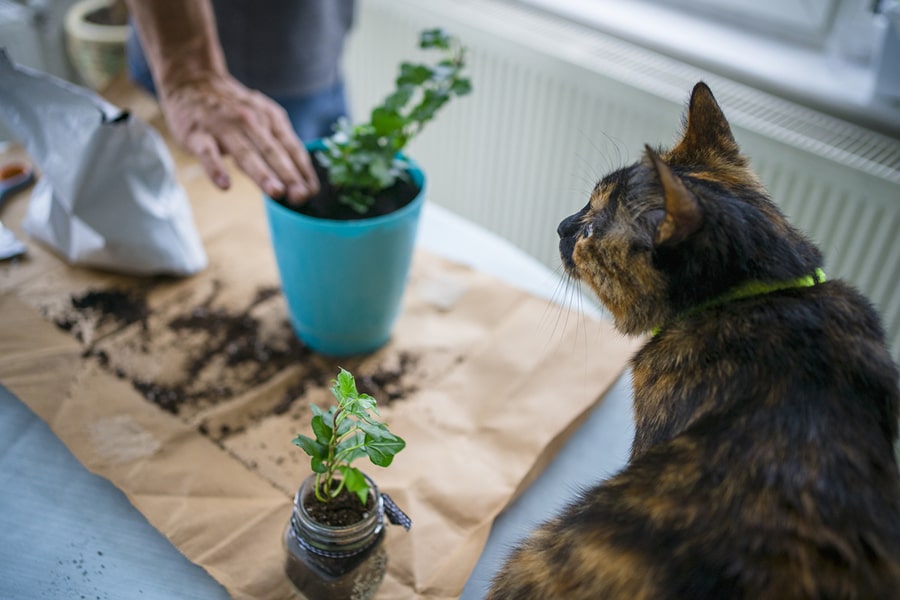7 Thanksgiving Safety Tips for Pets
Important tips designed to keep your Turkey Day celebrations pet-friendly.
Cats can be very sensitive to certain kinds of plants and, in some cases, just a small nibble can cause big problems. If you have a cat, it’s important to make sure you keep potentially harmful plants like these away from your whiskered friend.
This list is not comprehensive by any means, but you can find a more extensive list of poisonous plants for cats posted by the ASPCA® Animal Poison Control Center (APCC). On the bright side, if you find yourself to be a proud plant parent as well and want to let your green thumb shine, their inclusive list also shows many non-toxic plant options.
Do you also have a canine companion? Be sure to read up on these 15 plants that are toxic to dogs.

The symptoms can vary depending on the type of plant and how much your cat has eaten. They can range from a minor tummy ache to serious kidney failure and even result in death. These are some of the more common signs that your cat has eaten something poisonous:
Plants toxic to cats can also cause skin irritation or itchiness, so you may notice your cat pawing at their mouth and face. In addition, your cat could show behavioral signs that something is wrong, such as irritability or depression. Most cats are good at hiding when they don’t feel well, especially since they are naturally rather lazy animals. This means that even if you notice a subtle change in your cat’s behavior, it could be a sign of a more severe issue.
If you think your cat has ingested something poisonous, contact a veterinarian or the ASPCA Animal Poison Control Center (APCC) right away. The APCC is available 24 hours a day, 365 days a year at 888-426-4435 to help with emergencies involving poisoned pets. A $75 consultation fee may apply when you call, but a portion of that is covered if you have an ASPCA Pet Health Insurance plan.
The APCC is staffed with trained experts who have experience handling more than 3.5 million cases. They also have access to an extensive database, which helps them assess the situation and give treatment recommendations quickly. Plus, they are able to work with your veterinarian or an emergency hospital if your cat needs hands-on treatment.
Keep in mind that it’s not a good idea to try to treat your cat without professional advice, for instance, by attempting to induce vomiting. You could risk injuring your cat or yourself. Even the friendliest of kitties can bite or scratch when they’re scared or in pain. Also, do your best to remain calm, which can help your cat do the same.
Treatment for poisoning will depend on the substance your cat has ingested. Options could include administering fluid therapy or inducing vomiting. However, depending on what type of poison your cat has been exposed to, they may require different types of treatment and care. In some cases, your veterinarian may be able to provide treatment that can help prevent issues from occurring. In other instances, your veterinarian can closely monitor your cat for any signs of trouble, and they can provide treatment if or when necessary.
These treatments can get expensive, but they can also save your cat’s life. If you have a pet insurance plan, you could get reimbursed for these costs. Plus, pet insurance can help you focus on what’s best for your cat in an emergency with less worry about the price of care.
No matter the type of treatment your cat could require, it is essential that it be provided by a veterinary professional. Seeking out professional help can better ensure that your cat receives the best care possible, and they will hopefully have a safer and speedier recovery.

Cats and poisonous house plants do not make a good combination. The best way to prevent your cat from eating a toxic plant is to make sure there aren’t any around your home.
In addition, you should be careful to check any floral bouquets before displaying them in your home. Potentially dangerous flowers that are often found in floral arrangements can include Calla Lilies, Daffodils, Irises, Lilium, or Tulips. You can take out the problematic flowers before setting the bouquet in a vase, the exception being lilies. Lily pollen could possibly transfer onto the other plants, so to be on the safe side, it is best to find that floral bouquet a new home. You should also know that the little packet of fertilizer you get with many flower arrangements can cause issues like drooling or stomach upset if your feline friend were to get ahold of it.
Remember too that all cats should be kept indoors. This helps keep them safe from eating harmful outdoor plants, getting injured, or catching contagious diseases from other animals. Plus, it helps keep small wildlife safe from cats who might prey on them.
Just because you have a cat doesn’t mean you can’t have a little greenery around your home. There are plenty of cat-friendly plants that you can use to decorate, including:
You may be surprised with how many non-toxic plant options you could have. Just be sure to thoroughly do your research before bringing a new piece of greenery into your home.
There’s no way to ensure your cat won’t nibble on your plants, so you should eliminate any toxic ones from your home. If you decide to have a few non-toxic plants around, these tips can help you keep your cat from making a mess of them.
If you like the look of plants around your home but can’t seem to keep your cat out of them, you can always consider using silk or plastic ones.
The information presented in this article is for educational and informational purposes only and does not constitute or substitute for the advice of your veterinarian.
(opens new window)